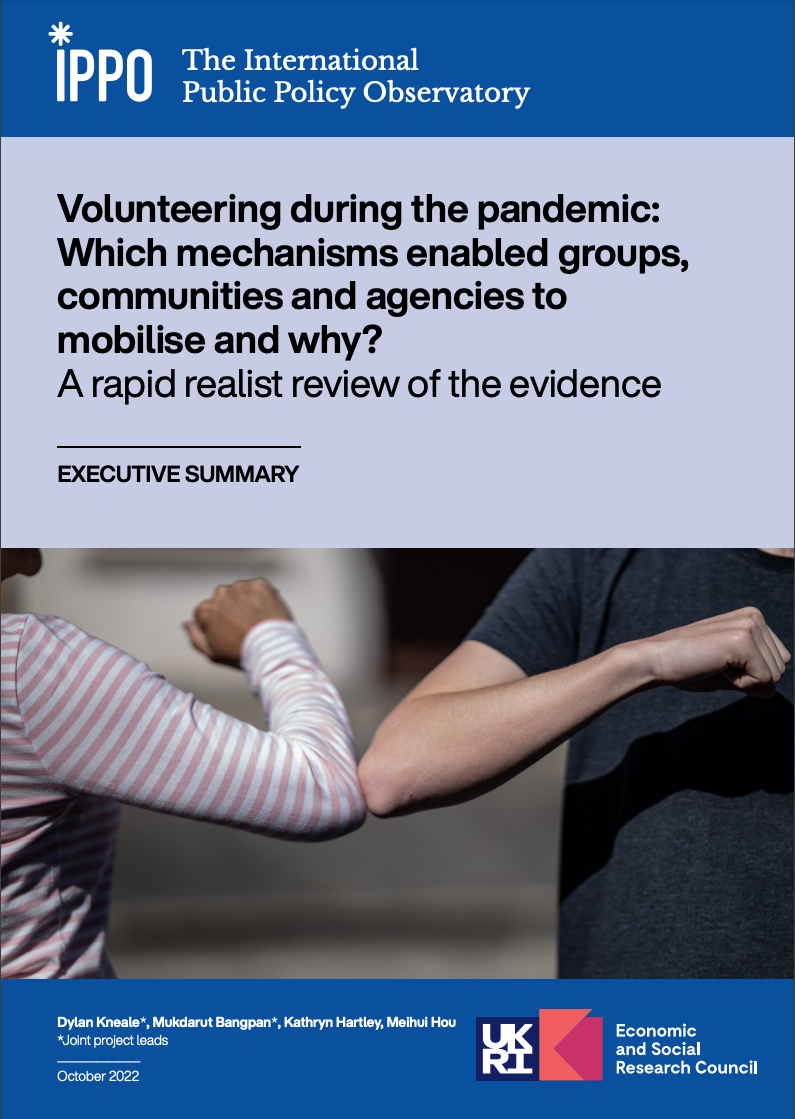Volunteering During the Pandemic: Which Mechanisms Enabled Groups, Communities and Agencies to Mobilise and Why?


The COVID-19 pandemic gave rise to an unprecedented level of interest in volunteering. In its wake, we have a unique opportunity to understand more about the impact and processes used to mobilise communities and groups to volunteer, and for policymakers and practitioners to ask how to build upon this outpouring of goodwill and better prepare for any new wave of voluntary action.
Since June 2022, the EPPI-Centre (UCL), which is part of the the International Public Policy Observatory (IPPO) collaboration, has been conducting a systematic review of the mechanisms that underpin the effectiveness of volunteering efforts.
The policy briefing that follows draws on the findings from IPPO’s review of the evidence, associated academic research, think-tank reports and current best practice to highlight lessons learned and options for strengthening the UK’s culture of volunteering and participation.
We have also produced a policy overview that both maps the policy and practice options for governments, and summarises policy interventions in use across the UK and its devolved adminstrations.
You can also watch our launch event here, where practioners discuss the findings and its implications for policy.
Strengthening the UK’s Culture of Volunteering Post-Covid-19
Why do we need to strengthen support for volunteering?
Volunteering is integral to welfare provision in the UK. Proponents claim that getting more people involved in their communities, more often and in more places, will solve problems including inequality, loneliness and low public trust. Policy proposals are often keen to increase the quantity of volunteering, which is still lower than in 2013/14. Practitioners focus more on improving the quality and impact of volunteering. Therefore, many argue that better-resourced infrastructure will help volunteers make a bigger difference – or, at the very least, prepare volunteer-involving organisations for future mobilisation. Support will also help volunteer involving organisations to manage broader structural and cultural changes accelerated by the pandemic. How people give time is changing: more episodic, less committed, informal, task-based, and digital. If organisations, including statutory bodies, want to involve volunteers in the future, policymakers need to consider more inclusive and effective practices for engaging volunteers.
What did we learn from pandemic volunteering?
Communities don’t need mobilising: communities are the first responders in crises, outpacing voluntary or statutory agencies. Challenges can arise from institutions’ preparedness and capacity to coordinate efforts. The successful creation of the National Emergencies Trust shows how to address this.
Many volunteered for the first time – while others stopped: 4.6m people were first-time volunteers during Covid-19. 9% of formal volunteers were involved in England for the first time, a figure rising to 21% of informal volunteers. However, as activities temporarily closed, other people stopped volunteering, including an estimated one in five formal volunteers. As volunteering behaviours become more episodic, making it easier to start, restart or conclude volunteering is an important goal for policy and practice.
Formal volunteering down, informal volunteering up: levels of formal volunteering – volunteering for organisations or clubs – fell during the pandemic. This was outweighed by a larger increase in informal volunteering, defined as helping people with activities such as shopping or just checking in. This is still lower than a decade ago. Informal volunteering was typified by the establishment of 4,300 mutual aid groups.
Acceleration and disruption: Covid-19 accelerated trends such as the shift to informal participation. It also acted as a disruptor: urgency drove agility and reduced bureaucracy around volunteer recruitment processes, while local government rediscovered the role of communities. The pandemic also surfaced tensions: local-central agency roles, coordination and relations, and the role and purpose of volunteers.
Strengthening the UK’s culture of volunteering post-Covid-19: what works for policy and practice
1. Show leadership: make a strategic commitment to involving volunteers
Develop a clear strategy and purpose: governments need a strategic approach is critical to mobilise, lead and manage volunteers. This starts with policies that set out why volunteering is needed and valued, such as the Scottish Government’s national outcomes framework or NHS England’s guide to recruiting and managing volunteers. Local approaches such as Cities of Service illustrate how place-based leadership can work.
Coordinate volunteers and agencies: visible senior leadership responsible for volunteering is essential. This requires clarity about how and why volunteer engagement is integral to delivering mission and outcomes. Communicating the role of the community in emergency preparedness is also necessary, but the voluntary sector’s involvement in Local Resilience Forums is variable and may require strengthening.
Create high-quality opportunities: a clear rationale for volunteers can create a strong role identity. Good opportunities are clear about how volunteers work alongside paid staff and how volunteering is mutually beneficial. #iwill’s six principles for high-quality youth social action are a good guide. Many organisations highlight the need to empower volunteers and treat them as equivalent to paid staff.
2. Make volunteering open and inclusive
Broker opportunities: making it easier for people to find suitable volunteering opportunities increasingly focuses on the role of national digital platforms such as NHS Volunteer Responders, Do-It or Team London. Volunteering bodies highlighted the importance of local infrastructure and supported volunteering.
Make volunteering accessible: policies that help people to get involved address accessibility (such as workplace adjustments), expenses, or time off from paid work. Ongoing concerns around access to volunteering by those claiming UC/JSA highlight challenges around policy implementation.
Flexibility: creating or adapting flexible volunteering opportunities that fit how people want to get involved is seen by organisations as essential. Practical ideas include role sharing, rotas and keeping in touch.
Promote Wellbeing: evidence links volunteering to wellbeing. Creating safe, welcoming environments where everyone can volunteer is essential. Worries about health were an often-cited reason for stopping volunteering – leaders need to recognise the risks of burnout and expecting too much. Support from peers and managers was found to help.
3. Invest in volunteer management and support
Commit resources: investment in organisations’ capacity of to engage and manage volunteers is perceived to be critical, with concerns that volunteers are seen as a cost-free resource. This means investment in leadership and management, and volunteer training or accreditation and administrative support.
Ensure a good quality volunteer experience: amid considerable interest in volunteer recruitment, some argue that more attention should focus on retention. With some evidence that volunteering stops when it becomes less enjoyable, this highlights the importance of good support and infrastructure so that volunteers stay and gain more experience – potentially leading them to take on new opportunities.
Invest in digital: although there is evidence that more people are seeking to volunteer digitally, many organisations argue for the need to widen technology in engaging and managing volunteers and adapting to new challenges. This includes recruitment platforms, passport schemes, and impact reporting. Digital volunteering opportunities such as befriending can meet interest in task-based opportunities, but it has been argued that these can be exclusionary or too transactional, undermining the benefits of getting involved.
4. Don’t just say thank you
Record and recognise the value of volunteering: volunteering benefits people, organisations and broader society – but this isn’t always captured. Policymakers should consider whether existing approaches capture the value of volunteering, particularly at the local scale. Organisations should put processes in place to track and assess the impact of volunteers. Policymakers may want to think about the role of regulators and funders in understanding how organisations involve volunteers, such as CQC, in health and social care.
Thank and celebrate volunteers: organisations need to ensure that volunteers are meaningfully thanked for their role, while many argue that more can be done to celebrate volunteering. Recognition that volunteers are more than unpaid labour, and a real connection with the community, helps volunteers feel supported.
Don’t take volunteers for granted: one of the themes to emerge from the pandemic was not to take the role of communities for granted. There is substantial evidence of burnout post-pandemic. Learning from other emergency responses suggests we must be realistic about sustaining community involvement.
5. Coordination is more important than mobilisation
Resource local volunteering infrastructure: At the local level, the pandemic saw renewed recognition and support for the coordinating role of local infrastructure bodies for volunteering and the voluntary sector. These are critical in developing local volunteering that is close to users, which might help broaden those involved in volunteering. Local infrastructure is uniquely knowledgeable but often feels ignored compared to national, top-down initiatives (about which there is still unresolved tension).
Coordination is key: policies that support and encourage coordination have been found to be necessary, whether formal or informal. Coordination helped to reduce confusion and duplication of effort. Examples include the VCS Emergencies Partnership and the Covid-19 Community Champion Scheme.
Trust people and organisations: volunteering is often ad hoc and informal, rooted in trust and reciprocity. Efforts to build trust and reciprocity at the community level, such as through events or community development, may encourage voluntary action. Similarly, empowering volunteers and giving people a sense of agency strengthens motivation and commitment.
